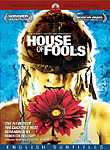
Richard Perle's comment yesterday that he couldn't imagine anyone choosing slavery over freedom set me to thinking about Andrei Konchalovsky's stunning Russian dramaHouse of Fools. In the tradition of One Flew Over the Cuckoo's Nest (1975) and King of Hearts, it has a different mentality. For in this film, the mad are not sane and the sane are not mad. Rather, the mad are really mad. The sane are really sane. But the situation and the suffering they face when put into each other's worlds is the conflict that makes the movie. What they have in common is their humanity. Mad and sane, Russian and Chechen, they are all human.
House of Fools is set during the first Chechen War (1996), in a small mental hospital on the border of the breakaway republic. As fighting nears, the doctor and nurse abandon the patients--a cross-section of the Russian public including everyone from dissidents to poets to Armenians and Muslims--ostensibly to find a bus in order to evacuate the hospital. Left to their own devices, the patients run amok. Then, the Chechens arrive, occupying the hospital. Some Russian troops follow, return a dead soldier, and sell the Chechens ammunition in exchange for drugs. The Chechen and Russian commander discover that they had been comrades-in-arms in Afghanistan, so the Russian lets the Chechen keep the dollars he had promised him ("for your mullah"). A beautiful and sensitive mental patient falls in love with one of the Chechen fighters, and tries to marry him--betraying her personal icon, Canadian singer Bryan Adams, to whom she has erected a shrine in her hospital room. (Canadians are saints, apparently, and heaven is a song and dance party on a passing train).
In the end, fighting resumes, so the wedding is not completed.
Then a band of Russians takes over the hosptital, chasing out the Chechens. Blood and death everywhere. The gates of the hospital are open, the patients could escape--but they decide to stay, and wait for the doctor to return. He does, and the patients remain in their "House of Fools," as the Russian soldiers leave.
What is striking about this film is that the Russian mental patients find life in the hospital is preferable to life outside. That is, where Jack Nicholson chooses freedom in Milosz Forman's film, Yulia Vsotskaya chooses to stay in confinement rather than go into the raging war between Russians and Chechens. The Russian hospital is a true asylum, a shelter from the violence and fear of the outside world. And while the American hospital is run by sadistic nurse Ratched, Dom Durakov's Russian hospital is commanded by a kindly doctor, who really does have his patients at heart.
So, whether one chooses freedom or security, it seems to me, depends on what is happening outside. Compared to the Chechen insanity, the mental hospital, as crazy as it is, is better. Now, it is pretty clear that the hospital is a symbol of the old USSR, the doctor leaving the collapse of the old system, the insanity that followed the chaos of the "bandit captialist" period, and the Chechen War--the Chechen War. The cast of characters is just so Russian--poets, dancers, dissidents, whores. The old saying that Russia has two problems--Roads and Fools--this is about the fools that are Russia,and humankind.
I can't recommend "House of Fools" highly enough. It is the Clash of Civilizations on a truly human scale. It is tragic, comic, and profound in turns. And should be required viewing for all "democracy revolutionists..."
